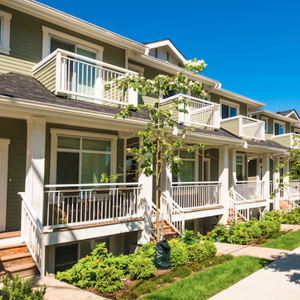
Low-interest rates are causing housing affordability problems for 80% of Canadians, according to a survey
During the outbreak of the pandemic, the Bank of Canada dropped its Overnight Lending Rate — which consumer banks use to determine their mortgage and line of credit rates — to a record low of 0.25 per cent to position the country for a strong economic recovery following COVID-19.
According to a new report, low-interest rates, combined with Canadians' desire for more space during lockdowns and stay-at-home orders, fueled housing demand, driving prices upward throughout 2020-21. National sales activity increased by 235 per cent between April of last year and March of this year, pushing the average home price up by 44 per cent.
According to the results of the study, Canadians are increasingly dissatisfied with the notion that today's cheap cost of borrowing makes it simpler to purchase a home. However, while 47 per cent of respondents agree that low mortgage rates have benefited home buyers' affordability (a little reduction from February), 34.4 per cent of respondents disagreed with that assertion, representing a 12.1per cent increase from the previous month.
Canadians, on the other hand, are unanimous in their belief that low mortgage interest rates are driving up the price of homes. 80.5 per cent of those polled said they agreed with that assertion (up 32.8 per cent). At the same time, 38.1 per cent of those who answered the survey believe that low mortgage rates have influenced their willingness to purchase a home.
Canadians are increasingly concerned about affordability, with a significant majority of 77.2 per cent of respondents saying that property prices in suburban areas and smaller towns have climbed to “unsustainable levels.” This is a 25.4 per cent increase from when the issue was first posted in February.
When asked what their primary concerns were when purchasing a home, respondents stated that affordability (78.2 per cent), participating in a bidding battle (70.3 per cent), and timing the market (51.9%) are the most important considerations.
In addition, given that the national average home price reached $662,000 in July, an increase of 15.6 per cent year on year, potential buyers will need to have increasingly higher income levels to be competitive in the marketplace. According to the study, of those who indicated they are interested in purchasing a home (56 per cent), 50 per cent now have a family income of more than $100,000 per year. Twenty per cent of those surveyed earn more than $160,000 per year, with the remaining 32 per cent earning less than $100,000 per year.
As the economy continues to reopen and firms announce their post-lockdown strategies, 7.1 per cent fewer respondents said they would continue to work from home following the end of COVID-19, bringing the total number of respondents who said they would continue to work from home to 29.7 per cent.
An additional 24.2 per cent stated that they have a hybrid working arrangement, representing a 6.4 per cent rise over the previous year. Meanwhile, the number of respondents who are currently working solely from their workspace has stayed steady since the February survey results were released.
However, even though many Canadians continue to work from home, homes with office space continue to be in great demand – albeit at a somewhat lower rate than it was in January. Following this, a total of 43 per cent of respondents reported that office space had become a more desired housing attribute, representing a decline of 15.9 per cent from the previous year.
On the other side, 65.8 per cent of respondents indicated outdoor space is still at the top of their home-buying wish lists – however, this represents a 10.5 per cent decrease from the previous month.
In light of the next federal election, which is less than a month away, and the pressing issue of home affordability, it will be interesting to observe how Canadians feel about the housing market in the months to come.
Image Source: updater.com









